Bosch GWS 18 V-LI Professional: English
English: Bosch GWS 18 V-LI Professional
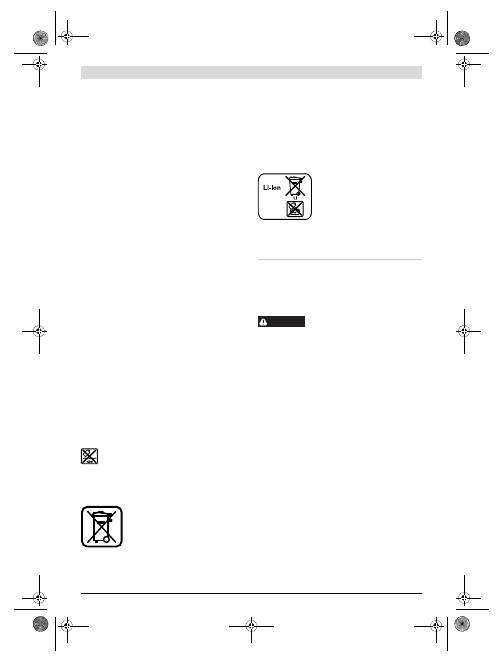
English |
15
Bosch Power Tools
1
6
0
9
92
A 01F | (10.1.13)
Deutschland
Robert Bosch GmbH
Servicezentrum Elektrowerkzeuge
Zur Luhne
2
3758
9
Kalefeld – Willershausen
Unter www.bosch-pt.com können Sie online Ersatzteile
bestellen oder Reparaturen anmelden.
Kundendienst: Tel.: (0711) 40040480
Fax: (0711) 40040481
E-Mail: Servicezentrum.Elektrowerkzeuge@de.bosch.com
Anwendungsberatung: Tel.: (0711) 40040480
Fax: (0711) 4004048
2
E-Mail: Anwendungsberatung.pt@de.bosch.com
Österreich
Tel.: (01) 7
9
7
222
010
Fax: (01) 7
9
7
222
011
E-Mail: service.elektrowerkzeuge@at.bosch.com
Schweiz
Tel.: (044) 8471511
Fax: (044) 8471551
E-Mail: Aftersales.Service@de.bosch.com
Luxemburg
Tel.: +3
2
2
588 058
9
Fax: +3
2
2
588 05
9
5
E-Mail: outillage.gereedschap@be.bosch.com
Transport
Die enthaltenen Li-Ionen-Akkus unterliegen den Anforderun-
gen des Gefahrgutrechts. Die Akkus können durch den Benut-
zer ohne weitere Auflagen auf der Straße transportiert werden.
Beim Versand durch Dritte (z.B.: Lufttransport oder Spedition)
sind besondere Anforderungen an Verpackung und Kennzeich-
nung zu beachten. Hier muss bei der Vorbereitung des Versand-
stückes ein Gefahrgut-Experte hinzugezogen werden.
Versenden Sie Akkus nur, wenn das Gehäuse unbeschädigt
ist. Kleben Sie offene Kontakte ab und verpacken Sie den
Akku so, dass er sich nicht in der Verpackung bewegt.
Bitte beachten Sie auch eventuelle weiterführende nationale
Vorschriften.
Entsorgung
Elektrowerkzeuge, Akkus, Zubehör und Verpackun-
gen sollen einer umweltgerechten Wiederverwertung
zugeführt werden.
Werfen Sie Elektrowerkzeuge und Akkus/Batterien nicht in
den Hausmüll!
Nur für EU-Länder:
Gemäß der europäischen Richtlinie
2
00
2
/
96
/EG müssen nicht mehr ge-
brauchsfähige Elektrowerkzeuge und ge-
mäß der europäischen Richtlinie
2
00
6
/
66
/EG müssen defekte oder ver-
brauchte Akkus/Batterien getrennt gesam-
melt und einer umweltgerechten Wiederverwendung zuge-
führt werden.
Nicht mehr gebrauchsfähige Akkus/Batterien können direkt
abgegeben werden bei:
Deutschland
Recyclingzentrum Elektrowerkzeuge
Osteroder Landstraße 3
3758
9
Kalefeld
Schweiz
Batrec AG
375
2
Wimmis BE
Akkus/Batterien:
Li-Ion:
Bitte beachten Sie die Hinweise im
Abschnitt „Transport“, Seite 15.
Änderungen vorbehalten.
English
Safety Notes
General Power Tool Safety Warnings
Read all safety warnings and all in-
structions.
Failure to follow the warnings
and instructions may result in electric shock, fire and/or seri-
ous injury.
Save all warnings and instructions for future reference.
The term “power tool” in the warnings refers to your mains-
operated (corded) power tool or battery-operated (cordless)
power tool.
Work area safety
Keep work area clean and well lit.
Cluttered or dark areas
invite accidents.
Do not operate power tools in explosive atmospheres,
such as in the presence of flammable liquids, gases or
dust.
Power tools create sparks which may ignite the dust
or fumes.
Keep children and bystanders away while operating a
power tool.
Distractions can cause you to lose control.
Electrical safety
Power tool plugs must match the outlet. Never modify
the plug in any way. Do not use any adapter plugs with
earthed (grounded) power tools.
Unmodified plugs and
matching outlets will reduce risk of electric shock.
Avoid body contact with earthed or grounded surfaces,
such as pipes, radiators, ranges and refrigerators.
There is an increased risk of electric shock if your body is
earthed or grounded.
Do not expose power tools to rain or wet conditions.
Water entering a power tool will increase the risk of electric
shock.
WARNING
OBJ_BUCH-1102-005.book Page 15 Thursday, January 10, 2013 11:03 AM
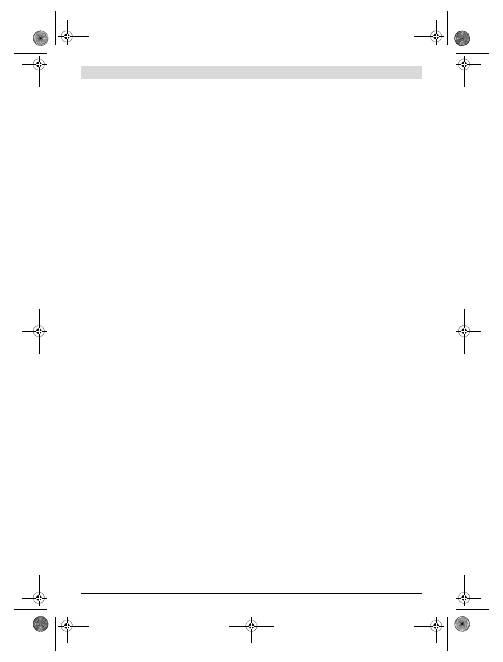
16
| English
1
6
0
9
92
A 01F | (10.1.13)
Bosch Power Tools
Do not abuse the cord. Never use the cord for carrying,
pulling or unplugging the power tool. Keep cord away
from heat, oil, sharp edges and moving parts.
Damaged
or entangled cords increase the risk of electric shock.
When operating a power tool outdoors, use an exten-
sion cord suitable for outdoor use.
Use of a cord suitable
for outdoor use reduces the risk of electric shock.
If operating a power tool in a damp location is unavoid-
able, use a residual current device (RCD) protected
supply.
Use of an RCD reduces the risk of electric shock.
Personal safety
Stay alert, watch what you are doing and use common
sense when operating a power tool. Do not use a power
tool while you are tired or under the influence of drugs,
alcohol or medication.
A moment of inattention while op-
erating power tools may result in serious personal injury.
Use personal protective equipment. Always wear eye
protection.
Protective equipment such as dust mask,
non-skid safety shoes, hard hat, or hearing protection
used for appropriate conditions will reduce personal inju-
ries.
Prevent unintentional starting. Ensure the switch is in
the off-position before connecting to power source
and/or battery pack, picking up or carrying the tool.
Carrying power tools with your finger on the switch or en-
ergising power tools that have the switch on invites acci-
dents.
Remove any adjusting key or wrench before turning
the power tool on.
A wrench or a key left attached to a ro-
tating part of the power tool may result in personal injury.
Do not overreach. Keep proper footing and balance at
all times.
This enables better control of the power tool in
unexpected situations.
Dress properly. Do not wear loose clothing or jewel-
lery. Keep your hair, clothing and gloves away from
moving parts.
Loose clothes, jewellery or long hair can be
caught in moving parts.
If devices are provided for the connection of dust ex-
traction and collection facilities, ensure these are con-
nected and properly used.
Use of dust collection can re-
duce dust-related hazards.
Power tool use and care
Do not force the power tool. Use the correct power tool
for your application.
The correct power tool will do the
job better and safer at the rate for which it was designed.
Do not use the power tool if the switch does not turn it
on and off.
Any power tool that cannot be controlled with
the switch is dangerous and must be repaired.
Disconnect the plug from the power source and/or the
battery pack from the power tool before making any
adjustments, changing accessories, or storing power
tools.
Such preventive safety measures reduce the risk of
starting the power tool accidentally.
Store idle power tools out of the reach of children and
do not allow persons unfamiliar with the power tool or
these instructions to operate the power tool.
Power
tools are dangerous in the hands of untrained users.
Maintain power tools. Check for misalignment or bind-
ing of moving parts, breakage of parts and any other
condition that may affect the power tool’s operation. If
damaged, have the power tool repaired before use.
Many accidents are caused by poorly maintained power
tools.
Keep cutting tools sharp and clean.
Properly maintained
cutting tools with sharp cutting edges are less likely to bind
and are easier to control.
Use the power tool, accessories and tool bits etc. in ac-
cordance with these instructions, taking into account
the working conditions and the work to be performed.
Use of the power tool for operations different from those
intended could result in a hazardous situation.
Battery tool use and care
Recharge only with the charger specified by the manu-
facturer.
A charger that is suitable for one type of battery
pack may create a risk of fire when used with another bat-
tery pack.
Use power tools only with specifically designated bat-
tery packs.
Use of any other battery packs may create a
risk of injury and fire.
When battery pack is not in use, keep it away from oth-
er metal objects, like paper clips, coins, keys, nails,
screws or other small metal objects, that can make a
connection from one terminal to another.
Shorting the
battery terminals together may cause burns or a fire.
Under abusive conditions, liquid may be ejected from
the battery; avoid contact. If contact accidentally oc-
curs, flush with water. If liquid contacts eyes, addition-
ally seek medical help.
Liquid ejected from the battery
may cause irritation or burns.
Service
Have your power tool serviced by a qualified repair per-
son using only identical replacement parts.
This will en-
sure that the safety of the power tool is maintained.
Safety Warnings for Angle Grinder
Safety Warnings common for Grinding, Sanding, Wire
Brushing or Abrasive Cutting Off Operations
This power tool is intended to function as a grinder,
sander, wire brush or cut-off tool. Read all safety warn-
ings, instructions, illustrations and specifications pro-
vided with this power tool.
Failure to follow all instruc-
tions listed below may result in electric shock, fire and/or
serious injury.
Operations such as polishing are not recommended to
be performed with this power tool.
Operations for which
the power tool was not designed may create a hazard and
cause personal injury.
Do not use accessories which are not specifically de-
signed and recommended by the tool manufacturer.
Just because the accessory can be attached to your power
tool, it does not assure safe operation.
The rated speed of the accessory must be at least equal
to the maximum speed marked on the power tool.
Ac-
cessories running faster than their rated speed can break
and fly apart.
OBJ_BUCH-1102-005.book Page 16 Thursday, January 10, 2013 11:03 AM
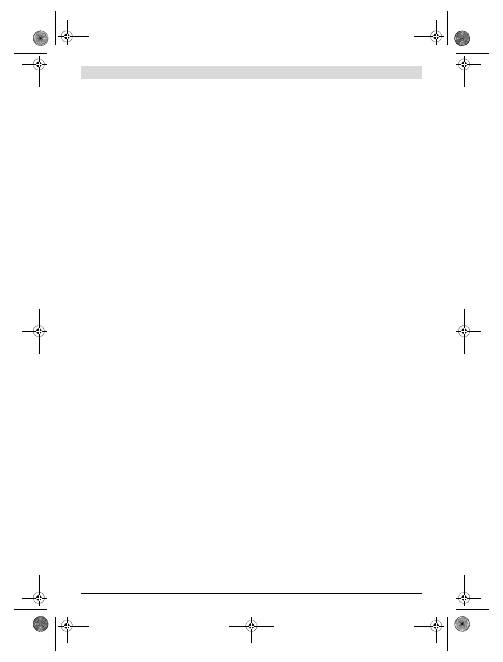
English |
17
Bosch Power Tools
1
6
0
9
92
A 01F | (10.1.13)
The outside diameter and the thickness of your acces-
sory must be within the capacity rating of your power
tool.
Incorrectly sized accessories cannot be adequately
guarded or controlled.
Treaded mounting of accessories must match the
grinder spindle thread. For accessories mounted by
flanges, the arbour hole of the accessory must fit the
locating diameter of the flange.
Accessories that do not
match the mounting hardware of the power tool will run out
of balance, vibrate excessively and may cause loss of con-
trol.
Do not use a damaged accessory. Before each use in-
spect the accessory such as abrasive wheels for chips
and cracks, backing pad for cracks, tear or excess
wear, wire brush for loose or cracked wires. If power
tool or accessory is dropped, inspect for damage or in-
stall an undamaged accessory. After inspecting and in-
stalling an accessory, position yourself and bystanders
away from the plane of the rotating accessory and run
the power tool at maximum no-load speed for one min-
ute.
Damaged accessories will normally break apart during
this test time.
Wear personal protective equipment. Depending on
application, use face shield, safety goggles or safety
glasses. As appropriate, wear dust mask, hearing pro-
tectors, gloves and workshop apron capable of stop-
ping small abrasive or workpiece fragments.
The eye
protection must be capable of stopping flying debris gen-
erated by various operations. The dust mask or respirator
must be capable of filtrating particles generated by your
operation. Prolonged exposure to high intensity noise may
cause hearing loss.
Keep bystanders a safe distance away from work area.
Anyone entering the work area must wear personal
protective equipment.
Fragments of workpiece or of a
broken accessory may fly away and cause injury beyond
immediate area of operation.
Hold power tool by insulated gripping surfaces only,
when performing an operation where the cutting ac-
cessory may contact hidden wiring.
Cutting accessory
contacting a “live” wire may make exposed metal parts of
the power tool “live” and shock the operator.
Never lay the power tool down until the accessory has
come to a complete stop.
The spinning accessory may gr-
ab the surface and pull the power tool out of your control.
Do not run the power tool while carrying it at your side.
Accidental contact with the spinning accessory could snag
your clothing, pulling the accessory into your body.
Regularly clean the power tool’s air vents.
The motor’s
fan will draw the dust inside the housing and excessive ac-
cumulation of powdered metal may cause electrical haz-
ards.
Do not operate the power tool near flammable materi-
als.
Sparks could ignite these materials.
Do not use accessories that require liquid coolants.
Us-
ing water or other liquid coolants may result in electrocu-
tion or shock.
Kickback and related warnings
Kickback is a sudden reaction to a pinched or snagged ro-
tating wheel, backing pad, brush or any other accessory.
Pinching or snagging causes rapid stalling of the rotating
accessory which in turn causes the uncontrolled power
tool to be forced in the direction opposite of the accesso-
ry’s rotation at the point of the binding.
For example, if an abrasive wheel is snagged or pinched by
the workpiece, the edge of the wheel that is entering into
the pinch point can dig into the surface of the material
causing the wheel to climb out or kick out. The wheel may
either jump toward or away from the operator, depending
on direction of the wheel’s movement at the point of pinch-
ing. Abrasive wheels may also break under these condi-
tions.
Kickback is the result of power tool misuse and/or incor-
rect operating procedures or conditions and can be avoid-
ed by taking proper precautions as given below.
Maintain a firm grip on the power tool and position your
body and arm to allow you to resist kickback forces. Al-
ways use auxiliary handle, if provided, for maximum
control over kickback or torque reaction during
start-up.
The operator can control torque reactions or
kickback forces, if proper precautions are taken.
Never place your hand near the rotating accessory.
Ac-
cessory may kickback over your hand.
Do not position your body in the area where power tool
will move if kickback occurs.
Kickback will propel the
tool in direction opposite to the wheel’s movement at the
point of snagging.
Use special care when working corners, sharp edges,
etc. Avoid bouncing and snagging the accessory.
Cor-
ners, sharp edges or bouncing have a tendency to snag the
rotating accessory and cause loss of control or kickback.
Do not attach a saw chain woodcarving blade or
toothed saw blade.
Such blades create frequent kickback
and loss of control.
Safety warnings specific for Grinding and Abrasive
Cutting-Off operations
Use only wheel types that are recommended for your
power tool and the specific guard designed for the se-
lected wheel.
Wheels for which the power tool was not de-
signed cannot be adequately guarded and are unsafe.
The grinding surface of the centre depressed wheels
must be mounted below the plane of the guard lip.
An
improperly mounted wheel that projects through the plane
of the guard lip cannot be adequately protected.
The guard must be securely attached to the power tool
and positioned for maximum safety, so the least
amount of wheel is exposed towards the operator.
The
guard helps to protect operator from broken wheel frag-
ments, accidental contact with wheel and sparks that
could ignite clothing.
Wheels must be used only for recommended applica-
tions. For example: do not grind with the side of the
cut-off wheel.
Abrasive cut-off wheels are intended for
peripheral grinding; side forces applied to these wheels
may cause them to shatter.
OBJ_BUCH-1102-005.book Page 17 Thursday, January 10, 2013 11:03 AM
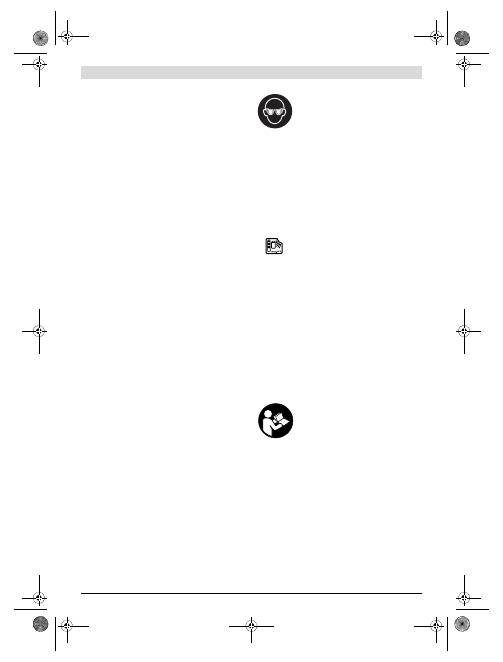
18
| English
1
6
0
9
92
A 01F | (10.1.13)
Bosch Power Tools
Always use undamaged wheel flanges that are of cor-
rect size and shape for your selected wheel.
Proper
wheel flanges support the wheel thus reducing the possi-
bility of wheel breakage. Flanges for cut-off wheels may be
different from grinding wheel flanges.
Do not use worn down wheels from larger power tools.
Wheels intended for larger power tools are not suitable for
the higher speed of a smaller tool and may burst.
Additional safety warnings specific for abrasive cutting
off operations
Do not “jam” the cut-off wheel or apply excessive pres-
sure. Do not attempt to make an excessive depth of cut.
Overstressing the wheel increases the loading and suscep-
tibility to twisting or binding of the wheel in the cut and the
possibility of kickback or wheel breakage.
Do not position your body in line with and behind the
rotating wheel.
When the wheel, at the point of operation,
is moving away from your body, the possible kickback may
propel the spinning wheel and the power tool directly at
you.
When wheel is binding or when interrupting a cut for
any reason, switch off the power tool and hold the pow-
er tool motionless until the wheel comes to a complete
stop. Never attempt to remove the cut-off wheel from
the cut while the wheel is in motion otherwise kickback
may occur.
Investigate and take corrective action to elimi-
nate the cause of wheel binding.
Do not restart the cutting operation in the workpiece.
Let the wheel reach full speed and carefully re-enter
the cut.
The wheel may bind, walk up or kickback if the
power tool is restarted in the workpiece.
Support panels or any oversized workpiece to minimize
the risk of wheel pinching and kickback.
Large work-
pieces tend to sag under their own weight. Supports must
be placed under the workpiece near the line of cut and near
the edge of the workpiece on both sides of the wheel.
Use extra caution when making a “pocket cut” into ex-
isting walls or other blind areas.
The protruding wheel
may cut gas or water pipes, electrical wiring or objects that
can cause kickback.
Safety warnings specific for sanding operations
Do not use excessively oversized sanding disc paper.
Follow manufacturers recommendations, when select-
ing sanding paper.
Larger sanding paper extending be-
yond the sanding pad presents a laceration hazard and
may cause snagging, tearing of the disc, or kickback.
Safety warnings specific for wire brushing operations
Be aware that wire bristles are thrown by the brush
even during ordinary operation. Do not overstress the
wires by applying excessive load to the brush.
The wire
bristles can easily penetrate light clothing and/or skin.
If the use of a guard is recommended for wire brushing,
do not allow any interference of the wire wheel or
brush with the guard.
Wire wheel or brush may expand in
diameter due to work load and centrifugal forces.
Additional safety warnings
Wear safety goggles.
Use appropriate detectors to determine if utility lines
are hidden in the work area or call the local utility com-
pany for assistance.
Contact with electric lines can lead
to fire and electric shock. Damaging a gas line can lead to
explosion. Penetrating a water line causes property dam-
age.
Do not touch grinding and cutting discs before they
have cooled down.
The discs can become very hot while
working.
Secure the workpiece.
A workpiece clamped with clamp-
ing devices or in a vice is held more secure than by hand.
Do not open the battery.
Danger of short-circuiting.
Protect the battery against heat, e. g., against
continuous intense sunlight, fire, water, and
moisture.
Danger of explosion.
In case of damage and improper use of the battery, va-
pours may be emitted. Ventilate the area and seek
medical help in case of complaints.
The vapours can irri-
tate the respiratory system.
Use the battery only in conjunction with your Bosch
power tool.
This measure alone protects the battery
against dangerous overload.
Use only original Bosch batteries with the voltage list-
ed on the nameplate of your power tool.
When using oth-
er batteries, e.g. imitations, reconditioned batteries or
other brands, there is danger of injury as well as property
damage through exploding batteries.
Product Description and Specifications
Read all safety warnings and all instruc-
tions.
Failure to follow the warnings and in-
structions may result in electric shock, fire
and/or serious injury.
While reading the operating instructions, unfold the graphics
page for the machine and leave it open.
Intended Use
The machine is intended for cutting, roughing and brushing of
metal and stone materials without the use of water.
For cutting with bonded abrasives, a special cutting guide (ac-
cessory) must be used.
When cutting in stone, provide for sufficient dust extraction.
With approved sanding tools, the machine can be used for
sanding with sanding discs.
Product Features
The numbering of the product features refers to the illustra-
tion of the machine on the graphics page.
1
Direction-of-rotation arrow on housing
2
Spindle lock button
OBJ_BUCH-1102-005.book Page 18 Thursday, January 10, 2013 11:03 AM
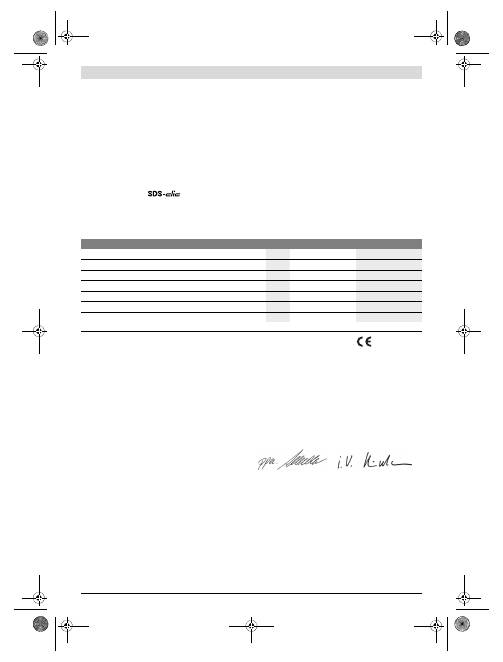
English |
19
Bosch Power Tools
1
6
0
9
92
A 01F | (10.1.13)
3
On/Off switch
4
Allen key
5
Battery pack*
6
Battery unlocking button*
7
Auxiliary handle (insulated gripping surface)
8
Grinder spindle
9
Locking screw for protection guard
10
Protection guard for grinding
11
Mounting flange with O-ring
12
Grinding wheel*
13
Clamping nut
14
Quick-clamping nut
*
15
Carbide grinding head*
16
Protection guard for cutting*
17
Cutting disc*
18
Hand guard*
19
Rubber sanding plate*
20
Sanding sheet*
21
Round nut*
22
Cup brush*
23
Button for charge-control indicator*
24
Battery charge-control indicator*
25
Handle (insulated gripping surface)
26
Cutting guide with dust extraction protection guard *
27
Diamond cutting disc*
*Accessories shown or described are not part of the standard de-
livery scope of the product. A complete overview of accessories
can be found in our accessories program.
Technical Data
Noise/Vibration Information
Measured sound values determined according to EN
6
0745.
Typically the A-weighted noise levels of the product are:
Sound pressure level 8
2
dB(A); Sound power level
9
3 dB(A).
Uncertainty K =3 dB.
Wear hearing protection!
Vibration total values a
h
(triax vector sum) and uncertainty K
determined according to EN
6
0745:
Surface grinding: a
h
=
6
.0 m/s
2
, K=1.5 m/s
2
,
Disk sanding: a
h
=
2
.5 m/s
2
, K=1.5 m/s
2
.
The vibration emission level given in this information sheet
has been measured in accordance with a standardised test
given in EN
6
0745 and may be used to compare one tool with
another. It may be used for a preliminary assessment of expo-
sure.
The declared vibration emission level represents the main ap-
plications of the tool. However if the tool is used for different
applications, with different accessories or poorly maintained,
the vibration emission may differ. This may significantly in-
crease the exposure level over the total working period.
An estimation of the level of exposure to vibration should also
take into account the times when the tool is switched off or
when it is running but not actually doing the job. This may sig-
nificantly reduce the exposure level over the total working pe-
riod.
Identify additional safety measures to protect the operator
from the effects of vibration such as: maintain the tool and the
accessories, keep hands warm, organise work patterns.
Declaration of Conformity
We declare under our sole responsibility that the product de-
scribed under “Technical Data” is in conformity with the fol-
lowing standards or standardization documents: EN
6
0745
according to the provisions of the directives
2
011/
6
5/EU,
2
004/108/EC,
2
00
6
/4
2
/EC.
Technical file (
2
00
6
/4
2
/EC) at:
Robert Bosch GmbH, PT/ETM
9
,
D-70745 Leinfelden-Echterdingen
Robert Bosch GmbH, Power Tools Division
D-70745 Leinfelden-Echterdingen
Leinfelden, 04.1
2
.
2
01
2
Assembly
Battery Charging
Use only the battery chargers listed on the accessories
page.
Only these battery chargers are matched to the lith-
ium ion battery of your power tool.
Angle Grinder
GWS 18 V-LI
GWS 18-125 V-LI
Article number
3
6
01 J3A 300
3
6
01 J3A 301
Rated voltage
V=
18
18
Rated speed
min
-1
10000
10000
Grinding disc diameter, max.
mm
115
1
2
5
Thread of grinder spindle
M 14
M 14
Thread length (max.) of grinder spindle
mm
22
22
Weight according to EPTA-Procedure 01/
2
003
kg
2
.1/
2
.3*
2
.1/
2
.3*
* dependent of the battery pack being used
Dr. Egbert Schneider
Senior Vice President
Engineering
Helmut Heinzelmann
Head of Product Certification
PT/ETM
9
OBJ_BUCH-1102-005.book Page 19 Thursday, January 10, 2013 11:03 AM
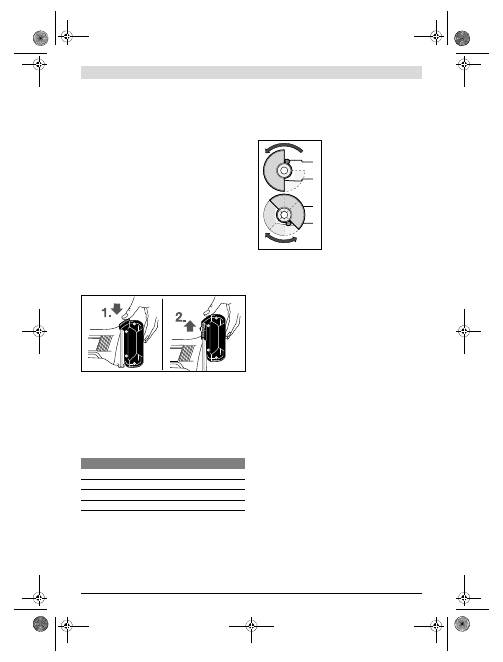
20
| English
1
6
0
9
92
A 01F | (10.1.13)
Bosch Power Tools
Note:
The battery is supplied partially charged. To ensure full
capacity of the battery, completely charge the battery in the
battery charger before using your power tool for the first time.
The Lithium-Ion battery can be charged at any time without
reducing its service life. Interrupting the charging procedure
does not damage the battery.
The Lithium-Ion battery is protected against deep discharging
by the “Electronic Cell Protection (ECP)”. When the battery is
empty, the machine is switched off by means of a protective
circuit: The inserted tool no longer rotates.
Do not continue to press the On/Off switch after the
machine has been automatically switched off.
The bat-
tery can be damaged.
The battery is equipped with a NTC temperature control
which allows charging only within a temperature range of be-
tween 0 °C and 45 °C. A long battery service life is achieved
in this manner.
Observe the notes for disposal.
Removing the battery
The battery
5
is equipped with two locking levels that should
prevent the battery from falling out when pushing the battery
unlocking button
6
unintentionally. As long as the battery is
inserted in the power tool, it is held in position by means of a
spring.
To remove the battery
5
, press the unlocking button
6
and
pull out the battery toward the front.
Do not exert any force.
Battery Charge-control Indication (see figure A)
The three green LEDs of the battery charge-control indicator
24
indicate the charge condition of the battery
5
. For safety
reasons, it is only possible to check the status of the charge
condition when the machine is at a standstill.
Press button
23
to indicate the charge condition. This is also
possible when the battery
5
is removed.
When no LED lights up after pushing button
23
, then the bat-
tery is defective and must be replaced.
Mounting the Protective Devices
Before any work on the machine itself (e. g. mainte-
nance, tool change, etc.) as well as during transport
and storage, remove the battery from the power tool.
There is danger of injury when unintentionally actuating
the On/Off switch.
Note:
After breakage of the grinding disc during operation or
damage to the holding fixtures on the protection guard/power
tool, the machine must promptly be sent to an after-sales ser-
vice agent for maintenance for addresses, see section “After-
sales Service and Application Service”.
Protection Guard for Grinding
Place the protection guard
10
on
the spindle collar. Adjust the posi-
tion of the protection guard
10
to
the requirements of the operation.
Lock the protection guard
10
tight-
ening the locking screw
9
with an al-
len key
4
.
Adjust the protection guard 10 in such a manner that
sparking is prevented in the direction of the operator.
Note:
The encoding keys on the protection guard
10
ensure
that only a protection guard that fits the machine type can be
mounted.
Protection Guard for Cutting
For cutting with bonded abrasives, always use the pro-
tection guard for cutting 16.
Provide for sufficient dust extraction when cutting
stone.
The protection guard for cutting
16
is mounted in the same
manner as the protection guard for grinding
10
.
Cutting Guide with Dust Extraction Protection Guard
The cutting guide with dust extraction protection guard
26
is
mounted in the same manner as the protection guard for
grinding
10
.
Auxiliary Handle
Operate your machine only with the auxiliary handle 7.
Screw the auxiliary handle
7
on the right or left of the machine
head depending on the working method.
Hand Guard
For operations with the rubber sanding plate 19 or with
the cup brush/wheel brush/flap disc, always mount the
hand guard 18.
The hand guard
18
is fastened with the auxiliary handle
7
.
Mounting the Grinding Tools
Before any work on the machine itself (e. g. mainte-
nance, tool change, etc.) as well as during transport
and storage, remove the battery from the power tool.
There is danger of injury when unintentionally actuating
the On/Off switch.
Do not touch grinding and cutting discs before they
have cooled down.
The discs can become very hot while
working.
LED
Capacity
Continuous lighting 3 x green
2
/3
Continuous lighting
2
x green
1/3
Continuous lighting 1 x green
<1/3
Flashing light 1 x green
Reserve
OBJ_BUCH-1102-005.book Page 20 Thursday, January 10, 2013 11:03 AM

English |
21
Bosch Power Tools
1
6
0
9
92
A 01F | (10.1.13)
Clean the grinder spindle
8
and all parts to be mounted.
For clamping and loosening the grinding tools, lock the grind-
er spindle with the spindle lock button
2
.
Actuate the spindle lock button only when the grinder
spindle is at a standstill.
Otherwise, the machine may be-
come damaged.
Grinding/Cutting Disc
Pay attention to the dimensions of the grinding tools. The
mounting hole diameter must fit the mounting flange without
play. Do not use reducers or adapters.
When using diamond cutting discs, pay attention that the di-
rection-of-rotation arrow on the diamond cutting disc and the
direction of rotation of the machine (see direction-of-rotation
arrow on the machine head) agree.
See graphics page for the mounting sequence.
To fasten the grinding/cutting disc, screw on the clamping nut
13
and tighten with the two-pin spanner; see Section “Quick-
clamping Nut ”.
After mounting the grinding tool and before switching
on, check that the grinding tool is correctly mounted
and that it can turn freely. Make sure that the grinding
tool does not graze against the protection guard or oth-
er parts.
A plastic part (O-ring) is fitted around
the centring collar of mounting flange
11
.
If the O-ring is missing or dam-
aged,
the mounting flange
11
must be
replaced before resuming operation.
Flap Disc
For operations with the flap disc, always mount the
hand guard 18.
Rubber Sanding Plate
For operations with the rubber sanding plate 19, al-
ways mount the hand guard 18.
See graphics page for the mounting sequence.
Screw on the round nut
21
and tighten with the two-pin span-
ner.
Cup Brush/Disc Brush
For operations with the cup brush/wheel brush, always
mount the hand guard 18.
See graphics page for the mounting sequence.
The cup brush/disc brush must be able to be screwed onto
the grinder spindle until it rests firmly against the grinder
spindle flange at the end of the grinder spindle threads. Tight-
en the cup brush/disc brush with an open-end spanner.
Quick-clamping Nut
For convenient changing of grinding tools without the use of
additional tools, you can use the quick-clamping nut
14
in-
stead of the clamping nut
13
.
The quick-clamping nut 14 may be used only for grind-
ing or cutting discs.
Use only a flawless, undamaged quick-clamping nut 14.
When screwing on, pay attention that the side of the
quick-clamping nut 14 with printing does not face the
grinding disc; the arrow must point to the index mark
28.
Lock the grinder spindle with
the spindle lock button
2
. To
tighten the quick-clamping
nut, firmly turn the grinding
disc in clockwise direction.
A properly attached, undam-
aged quick-clamping nut can
be loosened by hand when
turning the knurled ring in an-
ticlockwise direction.
Never loosen a tight quick-
clamping nut with pliers. Al-
ways use the two-pin span-
ner.
Insert the two-pin span-
ner as shown in the
illustration.
Approved Grinding Tools
All grinding tools mentioned in these operating instructions
can be used.
The permissible speed [min
-1
] or the circumferential speed
[m/s] of the grinding tools used must at least match the values
given in the table.
Therefore, observe the permissible
rotational/circumferen-
tial speed
on the label of the grinding tool.
max.
[mm]
[mm]
D
b
d
[min
-1
]
[m/s]
115
1
2
5
6
6
22
.
2
22
.
2
10000
10000
80
80
115
1
2
5
–
–
–
–
10000
10000
80
80
75
30
M 14
10000
45
28
b
d
D
D
D
b
d
OBJ_BUCH-1102-005.book Page 21 Thursday, January 10, 2013 11:03 AM
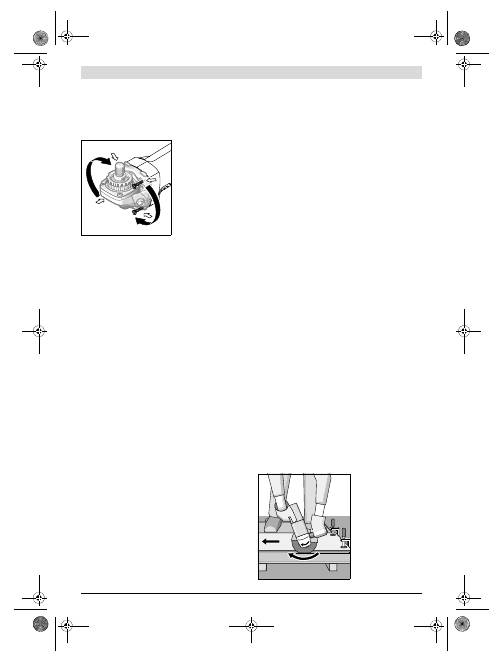
22
| English
1
6
0
9
92
A 01F | (10.1.13)
Bosch Power Tools
Rotating the Machine Head
Before any work on the machine itself (e. g. mainte-
nance, tool change, etc.) as well as during transport
and storage, remove the battery from the power tool.
There is danger of injury when unintentionally actuating
the On/Off switch.
The machine head can be
rotated with respect to
the machine housing in
9
0° steps. In this man-
ner, the On/Off switch
can be brought into a
more convenient position
for special working situa-
tions, e.g. for left-handed
persons.
Completely unscrew the
four screws. Rotate the
machine head carefully,
without removing it from the hous-
ing,
to the new position. Screw in and tighten the four screws
again.
Dust/Chip Extraction
Dusts from materials such as lead-containing coatings,
some wood types, minerals and metal can be harmful to
one’s health. Touching or breathing-in the dusts can cause
allergic reactions and/or lead to respiratory infections of
the user or bystanders.
Certain dusts, such as oak or beech dust, are considered
as carcinogenic, especially in connection with wood-treat-
ment additives (chromate, wood preservative). Materials
containing asbestos may only be worked by specialists.
– Provide for good ventilation of the working place.
– It is recommended to wear a P
2
filter-class respirator.
Observe the relevant regulations in your country for the
materials to be worked.
Prevent dust accumulation at the workplace.
Dusts can
easily ignite.
Operation
Starting Operation
Inserting the battery
Use only original Bosch lithium ion batteries with the
voltage listed on the nameplate of your power tool.
Us-
ing other batteries can lead to injuries and pose a fire haz-
ard.
Insert the charged battery
5
from the front into the base of the
power tool until the battery is securely locked.
Switching On and Off
To
start
the power tool, push the On/Off switch
3
forwards.
To
lock
the On/Off switch
3
, press the On/Off switch
3
down
at the front until it latches.
To
switch off
the power tool, release the On/Off switch
3
or,
if it is locked, briefly push down the back of the On/Off switch
3
and then release it.
To save energy, only switch the power tool on when using it.
Check grinding tools before using. The grinding tool
must be mounted properly and be able to move freely.
Carry out a test run for at least one minute with no load.
Do not use damaged, out-of-centre or vibrating grind-
ing tools.
Damaged grinding tools can burst and cause in-
juries.
Working Advice
Exercise caution when cutting slots in structural walls;
see Section “Information on Structures”.
Clamp the workpiece if it does not remain stationary
due to its own weight.
Do not strain the machine so heavily that it comes to a
standstill.
After heavily straining the power tool, continue to run it at
no-load for several minutes to cool down the accessory.
Do not touch grinding and cutting discs before they
have cooled down.
The discs can become very hot while
working.
Do not use the power tool with a cut-off stand.
When the power tool is electrostatically charged, the built-in
electronic control switches it off. To restart the power tool,
press the On/Off switch
3
again.
Rough Grinding
Never use a cutting disc for roughing.
The best roughing results are achieved when setting the ma-
chine at an angle of 30° to 40°. Move the machine back and
forth with moderate pressure. In this manner, the workpiece
will not become too hot, does not discolour and no grooves
are formed.
Flap Disc
With the flap disc (accessory), curved surfaces and profiles
can be worked.
Flap discs have a considerably higher service life, lower noise
levels and lower sanding temperatures than conventional
sanding sheets.
Cutting Metal
For cutting with bonded abrasives, always use the pro-
tection guard for cutting 16.
When cutting, work with moderate feed, adapted to the mate-
rial being cut. Do not exert pressure onto the cutting disc, tilt
or oscillate the machine.
Do not reduce the speed of running down cutting discs by ap-
plying sideward pressure.
The machine must al-
ways work in an up-
grinding motion. Other-
wise, the danger exists
of it being pushed
un-
controlled
out of the
cut.
When cutting profiles
and square bar, it is best
to start at the smallest
cross section.
OBJ_BUCH-1102-005.book Page 22 Thursday, January 10, 2013 11:03 AM
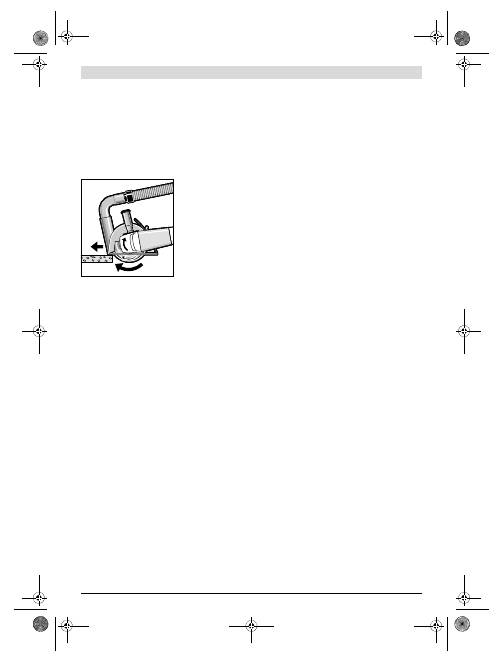
English |
23
Bosch Power Tools
1
6
0
9
92
A 01F | (10.1.13)
Cutting Stone
Provide for sufficient dust extraction when cutting
stone.
Wear a dust respirator.
The machine may be used only for dry cutting/grinding.
For cutting stone, it is best to use a diamond cutting disc.
When using the cutting guide with dust extraction protection
guard
26
, the vacuum cleaner must be approved for vacuum-
ing masonry dust. Suitable vacuum cleaners are available
from Bosch.
Switch on the machine
and place the front part
of the cutting guide on
the workpiece. Slide the
machine with moderate
feed, adapted to the ma-
terial to be worked.
For cutting expecially hard material, e. g., concrete with high
pebble content, the diamond cutting disc can overheat and
become damaged as a result. This is clearly indicated by cir-
cular sparking, rotating with the diamond cutting disc.
In this case, interrupt the cutting process and allow the dia-
mond cutting disc to cool by running the machine for a short
time at maximum speed with no load.
Noticeable decreasing work progress and circular sparking
are indications of a diamond cutting disc that has become
dull. Briefly cutting into abrasive material (e. g. lime-sand
brick) can resharpen the disc again.
Information on Structures
Slots in structural walls are subject to the Standard DIN 1053
Part 1, or country-specific regulations.
These regulations are to be observed under all circumstanc-
es. Before beginning work, consult the responsible structural
engineer, architect or the construction supervisor.
Recommendations for Optimal Handling of the Battery
Protect the battery against moisture and water.
Store the battery only within a temperature range between
0 °C and 50 °C. As an example, do not leave the battery in the
car in summer.
Occasionally clean the venting slots of the battery using a soft,
clean and dry brush.
A significantly reduced working period after charging indi-
cates that the battery is used and must be replaced.
Observe the notes for disposal.
Maintenance and Service
Maintenance and Cleaning
Before any work on the machine itself (e. g. mainte-
nance, tool change, etc.) as well as during transport
and storage, remove the battery from the power tool.
There is danger of injury when unintentionally actuating
the On/Off switch.
For safe and proper working, always keep the machine
and ventilation slots clean.
Please store and handle the accessory(-ies) carefully.
If the machine should fail despite the care taken in manufac-
turing and testing procedures, repair should be carried out by
an after-sales service centre for Bosch power tools.
In all correspondence and spare parts order, please always in-
clude the 10-digit article number given on the type plate of
the machine.
After-sales Service and Application Service
Our after-sales service responds to your questions concern-
ing maintenance and repair of your product as well as spare
parts. Exploded views and information on spare parts can al-
so be found under:
www.bosch-pt.com
Bosch’s application service team will gladly answer questions
concerning our products and their accessories.
Great Britain
Robert Bosch Ltd. (B.S.C.)
P.O. Box
9
8
Broadwater Park
North Orbital Road
Denham
Uxbridge
UB
9
5HJ
Tel. Service: (0844) 73
6
010
9
Fax: (0844) 73
6
014
6
E-Mail: boschservicecentre@bosch.com
Ireland
Origo Ltd.
Unit
2
3 Magna Drive
Magna Business Park
City West
Dublin
2
4
Tel. Service: (01) 4
666
700
Fax: (01) 4
666
888
Australia, New Zealand and Pacific Islands
Robert Bosch Australia Pty. Ltd.
Power Tools
Locked Bag
66
Clayton South VIC 31
69
Customer Contact Center
Inside Australia:
Phone: (01300) 307044
Fax: (01300) 307045
OBJ_BUCH-1102-005.book Page 23 Thursday, January 10, 2013 11:03 AM
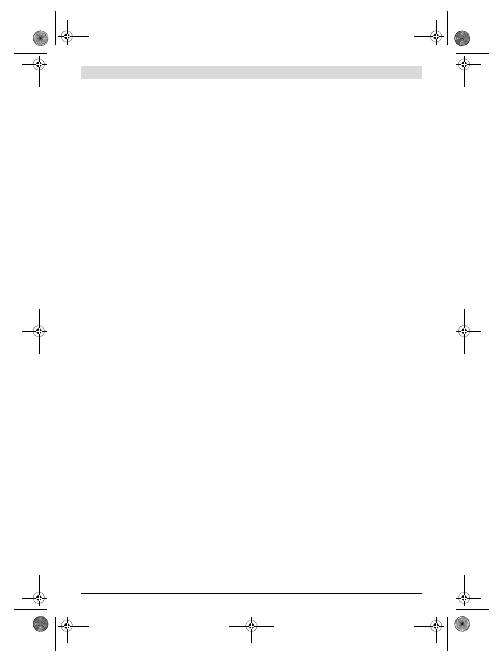
24
| English
1
6
0
9
92
A 01F | (10.1.13)
Bosch Power Tools
Inside New Zealand:
Phone: (0800) 543353
Fax: (0800) 4
2
8570
Outside AU and NZ:
Phone: +
6
1 3
9
5415555
www.bosch.com.au
Republic of South Africa
Customer service
Hotline: (011)
6
51
96
00
Gauteng – BSC Service Centre
35 Roper Street, New Centre
Johannesburg
Tel.: (011) 4
9
3
9
375
Fax: (011) 4
9
301
26
E-Mail: bsctools@icon.co.za
KZN – BSC Service Centre
Unit E, Almar Centre
143 Crompton Street
Pinetown
Tel.: (031) 701
2
1
2
0
Fax: (031) 701
2
44
6
E-Mail: bsc.dur@za.bosch.com
Western Cape – BSC Service Centre
Democracy Way, Prosperity Park
Milnerton
Tel.: (0
2
1) 551
2
577
Fax: (0
2
1) 5513
22
3
E-Mail: bsc@zsd.co.za
Bosch Headquarters
Midrand, Gauteng
Tel.: (011)
6
51
96
00
Fax: (011)
6
51
9
880
E-Mail: rbsa-hq.pts@za.bosch.com
People’s Republic of China
China Mainland
Bosch Power Tools (China) Co., Ltd.
5
6
7, Bin Kang Road
Bin Jiang District 31005
2
Hangzhou, P.R.China
Service Hotline: 4008
26
8484
Fax: (0571) 8777450
2
E-Mail: contact.ptcn@cn.bosch.com
www.bosch-pt.com.cn
HK and Macau Special Administrative Regions
Robert Bosch Hong Kong Co. Ltd.
2
1st Floor,
62
5 King’s Road
North Point, Hong Kong
Customer Service Hotline: +85
2
2
101 0
2
35
Fax: +85
2
2
5
9
0
9
7
62
E-Mail: info@hk.bosch.com
www.bosch-pt.com.hk
Indonesia
PT. Multi Mayaka
Kawasan Industri Pulogadung
Jalan Rawa Gelam III No.
2
Jakarta 13
9
30
Indonesia
Tel.: (0
2
1) 4
6
83
2
5
22
Fax: (0
2
1) 4
6
8
2
8
6
45/
6
8
2
3
E-Mail: sales@multimayaka.co.id
www.bosch-pt.co.id
Philippines
Robert Bosch, Inc.
2
8th Floor Fort Legend Towers,
3rd Avenue corner 31st Street,
Fort Bonifacio Global City,
1
6
34 Taguig City, Philippines
Tel.: (0
2
) 8703871
Fax: (0
2
) 8703870
matheus.contiero@ph.bosch.com
www.bosch-pt.com.ph
Bosch Service Center:
9
7
2
5-
2
7 Kamagong Street
San Antonio Village
Makati City, Philippines
Tel.: (0
2
) 8
999
0
9
1
Fax: (0
2
) 8
9
7
6
43
2
rosalie.dagdagan@ph.bosch.com
Malaysia
Robert Bosch (S.E.A.) Sdn. Bhd.
No. 8A, Jalan 13/
6
G.P.O. Box 10818
4
62
00 Petaling Jaya
Selangor, Malaysia
Tel.: (03) 7
966
31
9
4
Fax: (03) 7
9
583838
cheehoe.on@my.bosch.com
Toll-Free: 1800 880188
www.bosch-pt.com.my
Thailand
Robert Bosch Ltd.
Liberty Square Building
No.
2
87, 11 Floor
Silom Road, Bangrak
Bangkok 10500
Tel.: 0
2
6
31187
9
– 1888 (10 lines)
Fax: 0
2
2
384783
Robert Bosch Ltd., P. O. Box
2
054
Bangkok 10501, Thailand
Bosch Service – Training Centre
2
8
69
-
2
8
69
/1 Soi Ban Kluay
Rama IV Road (near old Paknam Railway)
Prakanong District
10110 Bangkok
Thailand
Tel.: 0
2
6
717800 – 4
Fax: 0
2
2
4
9
4
296
Fax: 0
2
2
4
9
5
299
OBJ_BUCH-1102-005.book Page 24 Thursday, January 10, 2013 11:03 AM

